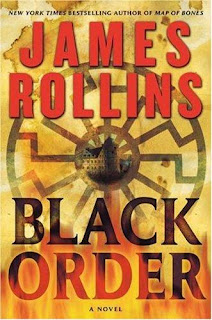In Black Order, published June 2006, SIGMA Force team members risk their lives to get to the heart of one of humankind's greatest mysteries: the origins of life itself.
From the book
The body floated in the sludge that sluiced through the dank sewers. The corpse of a boy, bloated and rat gnawed, had been stripped of boots, pants, and shirt. Nothing went to waste in the besieged city.
SS Obergruppenfuhrer Jakob Sporrenberg nudged past the corpse, stirring the filth. Offal and excrement. Blood and bile. The wet scarf tied around his nose and mouth did little to ward off the stench. This was what the great war had come to. The mighty reduced to crawling through sewers to escape. But he had his orders.
Overhead the double crump-wump of Russian artillery pummeled the city. Each explosion bruised his gut with its concussive shock. The Russians had broken down the gates, bombed the airport, and even now, tanks ground down the cobbled streets while transport carriers landed on Kaiserstrasse. The main thoroughfare had been converted into a landing strip by parallelrows of flaming oil barrels, adding their smoke to the already choked early morning skies, keeping dawn at bay. Fighting waged in every street, in every home, from attic to basement.
Every house a fortress.
That had been Gaufefter Hanke's final command to the populace. The city had to hold out as long as possible. The future of the Third Reich depended on it.
And on Jakob Sporrenberg.
"Mach schneff,'he urged the others behind him.
His unit of the Sicherheitsdienst—designation Special Evacuation Kommando—trailed him, knee-deep in filthy water. Fourteen men. All armed. All dressed in black. All burdened with heavy packs. In the middle, four of the largest men, former Nordsee dockmen, bore poles on their shoulders, bearing aloft massive crates.
There was a reason the Russians were striking this lone city deep in the Sudeten Mountains between Germany and Poland. The fortifications ofBreslau guarded the gateway to the highlands beyond. For the past two years, forced labor from the concentration camp of Gross-Rosen had hollowed out a neighboring mountain peak. A hundred kilometers of tunnels clawed and blasted, all to service one secret project, one kept buried away from prying Allied eyes.
Read "Black Order" full book now
From the book
The body floated in the sludge that sluiced through the dank sewers. The corpse of a boy, bloated and rat gnawed, had been stripped of boots, pants, and shirt. Nothing went to waste in the besieged city.
SS Obergruppenfuhrer Jakob Sporrenberg nudged past the corpse, stirring the filth. Offal and excrement. Blood and bile. The wet scarf tied around his nose and mouth did little to ward off the stench. This was what the great war had come to. The mighty reduced to crawling through sewers to escape. But he had his orders.
Overhead the double crump-wump of Russian artillery pummeled the city. Each explosion bruised his gut with its concussive shock. The Russians had broken down the gates, bombed the airport, and even now, tanks ground down the cobbled streets while transport carriers landed on Kaiserstrasse. The main thoroughfare had been converted into a landing strip by parallelrows of flaming oil barrels, adding their smoke to the already choked early morning skies, keeping dawn at bay. Fighting waged in every street, in every home, from attic to basement.
Every house a fortress.
That had been Gaufefter Hanke's final command to the populace. The city had to hold out as long as possible. The future of the Third Reich depended on it.
And on Jakob Sporrenberg.
"Mach schneff,'he urged the others behind him.
His unit of the Sicherheitsdienst—designation Special Evacuation Kommando—trailed him, knee-deep in filthy water. Fourteen men. All armed. All dressed in black. All burdened with heavy packs. In the middle, four of the largest men, former Nordsee dockmen, bore poles on their shoulders, bearing aloft massive crates.
There was a reason the Russians were striking this lone city deep in the Sudeten Mountains between Germany and Poland. The fortifications ofBreslau guarded the gateway to the highlands beyond. For the past two years, forced labor from the concentration camp of Gross-Rosen had hollowed out a neighboring mountain peak. A hundred kilometers of tunnels clawed and blasted, all to service one secret project, one kept buried away from prying Allied eyes.
Read "Black Order" full book now

No comments:
Post a Comment
leave your opinion